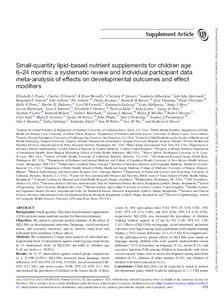Small-quantity lipid-based nutrient supplements for children age 6-24 months : A systematic review and individual participant data meta-analysis of effects on developmental outcomes and effect modifiers
Prado, Elizabeth L.; Arnold, Charles D.; Wessells, K. Ryan; Stewart, Christine P.; Abbeddou, Souheila; Adu-Afarwuah, Seth; Arnold, Benjamin F.; Ashorn, Ulla; Ashorn, Per; Becquey, Elodie; Brown, Kenneth H.; Chandna, Jaya; Christian, Parul; Dentz, Holly N.; Dulience, Sherlie J.L.; Fernald, Lia C.H.; Galasso, Emanuela; Hallamaa, Lotta; Hess, Sonja Y.; Huybregts, Lieven; Iannotti, Lora L.; Jimenez, Elizabeth Y.; Kohl, Patricia; Lartey, Anna; Le Port, Agnes; Luby, Stephen P.; Maleta, Kenneth; Matchado, Andrew; Matias, Susana L.; Mridha, Malay K.; Ntozini, Robert; Null, Clair; Ocansey, Maku E.; Parvez, Sarker M.; Phuka, John; Pickering, Amy J.; Prendergast, Andrew J.; Shamim, Abu A.; Siddiqui, Zakia; Tofail, Fahmida; Weber, Ann M.; Wu, Lee S.F.; Dewey, Kathryn G. (2021)
Prado, Elizabeth L.
Arnold, Charles D.
Wessells, K. Ryan
Stewart, Christine P.
Abbeddou, Souheila
Adu-Afarwuah, Seth
Arnold, Benjamin F.
Ashorn, Ulla
Ashorn, Per
Becquey, Elodie
Brown, Kenneth H.
Chandna, Jaya
Christian, Parul
Dentz, Holly N.
Dulience, Sherlie J.L.
Fernald, Lia C.H.
Galasso, Emanuela
Hallamaa, Lotta
Hess, Sonja Y.
Huybregts, Lieven
Iannotti, Lora L.
Jimenez, Elizabeth Y.
Kohl, Patricia
Lartey, Anna
Le Port, Agnes
Luby, Stephen P.
Maleta, Kenneth
Matchado, Andrew
Matias, Susana L.
Mridha, Malay K.
Ntozini, Robert
Null, Clair
Ocansey, Maku E.
Parvez, Sarker M.
Phuka, John
Pickering, Amy J.
Prendergast, Andrew J.
Shamim, Abu A.
Siddiqui, Zakia
Tofail, Fahmida
Weber, Ann M.
Wu, Lee S.F.
Dewey, Kathryn G.
2021
Julkaisun pysyvä osoite on
https://urn.fi/URN:NBN:fi:tuni-202111298764
https://urn.fi/URN:NBN:fi:tuni-202111298764
Kuvaus
Peer reviewed
Tiivistelmä
Background: Small-quantity (SQ) lipid-based nutrient supplements (LNSs) provide many nutrients needed for brain development. Objectives: We aimed to generate pooled estimates of the effect of SQ-LNSs on developmental outcomes (language, social-emotional, motor, and executive function), and to identify study-level and individual-level modifiers of these effects. Methods: We conducted a 2-stage meta-analysis of individual participant data from 14 intervention against control group comparisons in 13 randomized trials of SQ-LNSs provided to children age 6-24 mo (total n = 30,024). Results: In 11-13 intervention against control group comparisons (n = 23,588-24,561), SQ-LNSs increased mean language (mean difference: 0.07 SD; 95% CI: 0.04, 0.10 SD), social-emotional (0.08; 0.05, 0.11 SD), and motor scores (0.08; 95% CI: 0.05, 0.11 SD) and reduced the prevalence of children in the lowest decile of these scores by 16% (prevalence ratio: 0.84; 95% CI: 0.76, 0.92), 19% (0.81; 95% CI: 0.74, 0.89), and 16% (0.84; 95% CI: 0.76, 0.92), respectively. SQ-LNSs also increased the prevalence of children walking without support at 12 mo by 9% (1.09; 95% CI: 1.05, 1.14). Effects of SQ-LNSs on language, social-emotional, and motor outcomes were larger among study populations with a higher stunting burden (≥35%) (mean difference: 0.11-0.13 SD; 8-9 comparisons). At the individual level, greater effects of SQ-LNSs were found on language among children who were acutely malnourished (mean difference: 0.31) at baseline; on language (0.12), motor (0.11), and executive function (0.06) among children in households with lower socioeconomic status; and on motor development among later-born children (0.11), children of older mothers (0.10), and children of mothers with lower education (0.11). Conclusions: Child SQ-LNSs can be expected to result in modest developmental gains, which would be analogous to 1-1.5 IQ points on an IQ test, particularly in populations with a high child stunting burden. Certain groups of children who experience higher-risk environments have greater potential to benefit from SQ-LNSs in developmental outcomes.
Kokoelmat
- TUNICRIS-julkaisut [16929]
